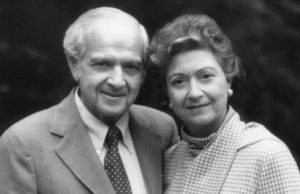Main Menu

David and Mickey Bazelon
The David and Mickey Bazelon Fellowship in Mental Health Law provides an opportunity for a recent graduate of Georgetown University Law Center to work with the Judge David L. Bazelon Center for Mental Health Law, the nation’s premier legal advocacy organization for people with mental disabilities. Founded in 1972, the Bazelon Center is a leader in promoting community integration and self-determination for people with mental disabilities. The Bazelon Center promotes these ideals in its work on a wide variety of issues, including education (K-12 and higher education), health law, immigration, housing, employment, criminal legal system reform, and artificial intelligence.
The public interest fellowship is a two-year, paid position with a salary of $60,000 and generous benefits. The fellow will work in the Bazelon Center’s office in Washington, D.C., doing policy work and helping to develop and litigate groundbreaking civil rights cases to advance the rights of adults and children with mental disabilities and to reform public systems. The fellow will have an opportunity to work with leaders in the disability rights field, both inside and outside the Center. The Bazelon Center’s staff includes attorneys, policy advocates, and other professionals.
Some of our current litigation and policy priorities include: enforcing the Americans with Disabilities Act’s integration mandate and Medicaid Act entitlements by suing the District of Columbia for failing to provide community-based services to children with mental health disabilities, developing a framework to move children with mental health disabilities out of immigration detention, ensuring that institutions like Brown University and Yale University provide students with disabilities reasonable accommodations and that school districts do not force students out of school because of their disabilities, preventing the incarceration of individuals with mental health disabilities, and advocating for mental health – not law enforcement – responses to people experiencing mental health crises.
Qualifications for the fellowship include a strong commitment to civil rights and social justice; excellent analytical and writing skills; and being a 2022-2024 Georgetown Law graduate (J.D.). Knowledge of and experience in disability rights and/or mental health law is preferred but not essential. The two-year fellowship will start in August/September 2024 and conclude in August/September 2026.
To submit an application, please send the following materials via PDF attachment to Anashua Dutta, David and Mickey Bazelon Fellow (2022-2024):
The application deadline is October 20, 2023.
Read the Fellowship Announcement (PDF).
In 1972, forward thinking legal scholars and advocates founded the organization, then the Mental Health Law Project, to secure the civil rights of people housed in institutional settings. In the decades since, the Judge David L. Bazelon Center for Mental Health Law has expanded our advocacy to protecting the right to self-determination and securing access to needed services, so children and adults with mental disabilities can lead their own lives as full members of the community.
Our precedent-setting litigation helps shape strategies for attorneys from legal aid agencies to the U.S. Department of Justice. Our pro-bono partners are among the top firms in the country. Most importantly, our work has outlawed institutional abuse, won protections against arbitrary confinement, and opened public schools, workplaces, housing and other opportunities for people with mental disabilities.
Born in Wisconsin, David L. Bazelon grew up in Chicago and practiced law there. In 1949, President Truman named him to the United States Court of Appeals for the District of Columbia Circuit, often described as the country’s most influential court, next to the U.S. Supreme Court. At 40, he was the youngest judge ever appointed to that court. From 1962-1978 he served as chief judge, retiring in 1986 as a senior judge.
With his decisions, Chief Judge Bazelon pioneered the field of mental health law, holding that people committed to mental hospitals have a right to receive meaningful treatment in the least restrictive setting possible. Judge Bazelon became a leading thinker and activist on the intersection of social science, law and public policy. “Judge Bazelon has done more than any other single lawyer to remind the legal profession of its obligation to keep pace with extra-legal developments in the area of mental health,” said his good friend Justice William Brennan. The Judge David L. Bazelon Center for Mental Health Law is dedicated to building on Judge Bazelon’s legacy.
Miriam (Mickey) Kellner Bazelon was a partner in her husband’s fight for social justice and a vigorous advocate for children and families. She served on many boards and became the first woman president of the Jewish Social Service Agency. She joined the federal government during President Johnson’s War on Poverty, where she was instrumental in the creation of Head Start. After the Judge’s passing, Mickey married Robert Knox and continued her work. Mickey became an honorary trustee of the Bazelon Center in 1993 and tirelessly championed the Bazelon Center’s efforts for children with mental disorders until her death in 2011.
Updated October 07, 2019
© 2016-Present Bazelon Center. All rights reserved.